Introduction to Spirituality and the Steps
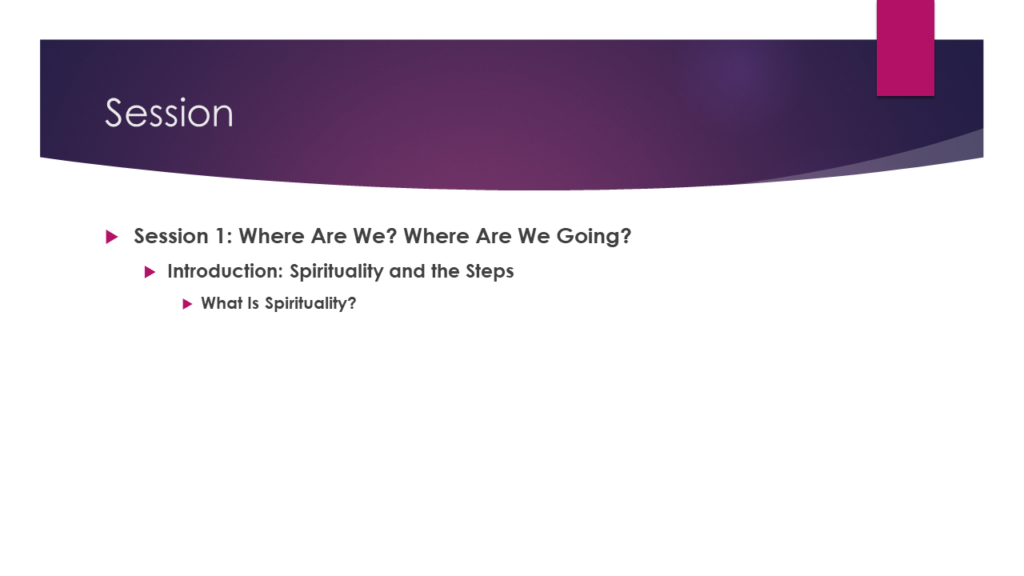
In this first segment, we’re going to be examining spirituality and giving a brief introduction to the steps.
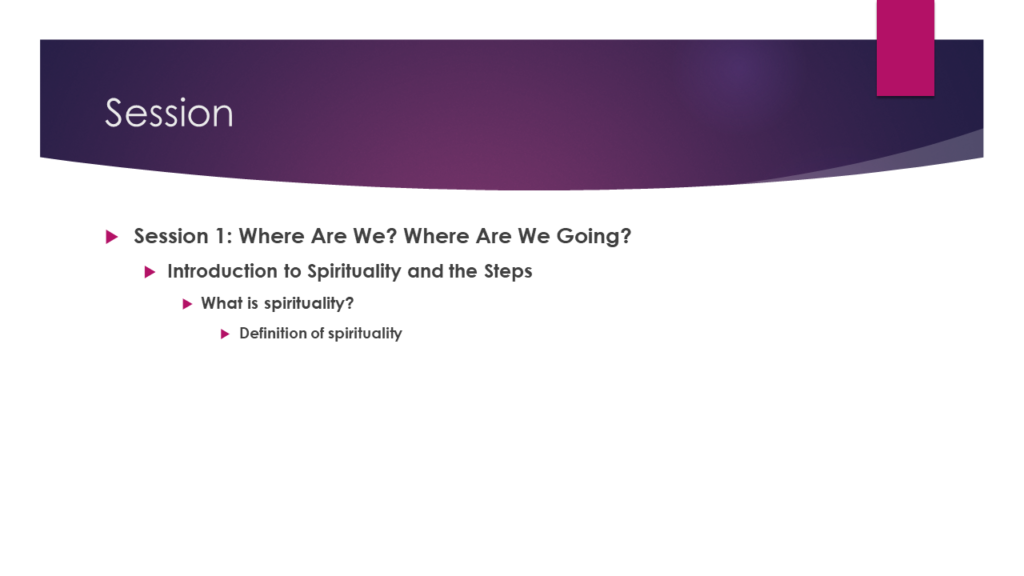
First, we’ll develop a definition of spirituality that consists of four elements: interrelationship, the Transcendent, universality, and purpose.
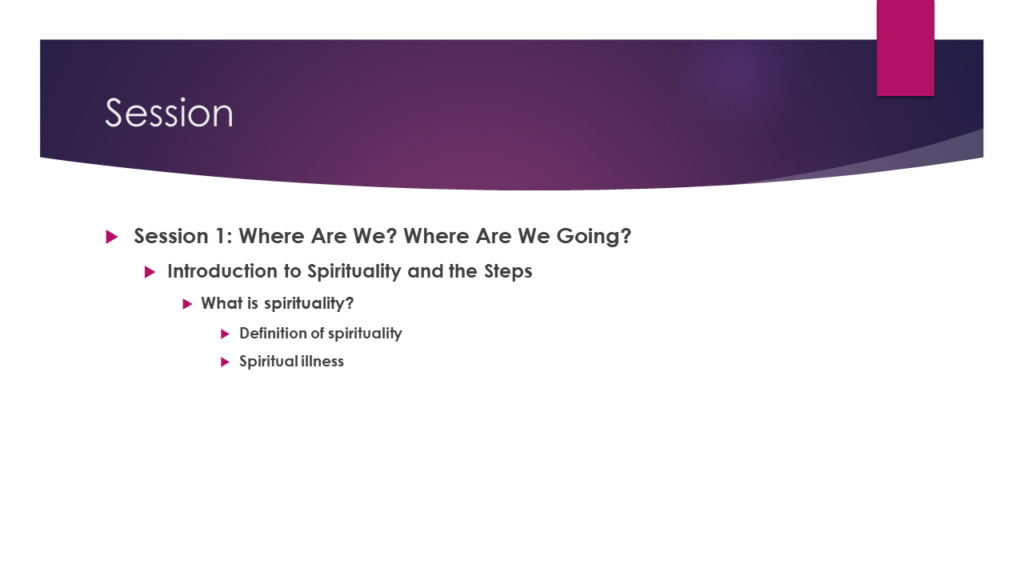
Then, we’ll see how difficult it is to develop a mature spirituality and why a life without spirituality doesn’t work. Finally, we’ll talk about the results of a lack of spirituality as a spiritual illness with real symptoms.
Before we consider how to become spiritual (or even more spiritual), we’d better make sure we know what we’re talking about.
Here’s one definition of spirituality:[1]
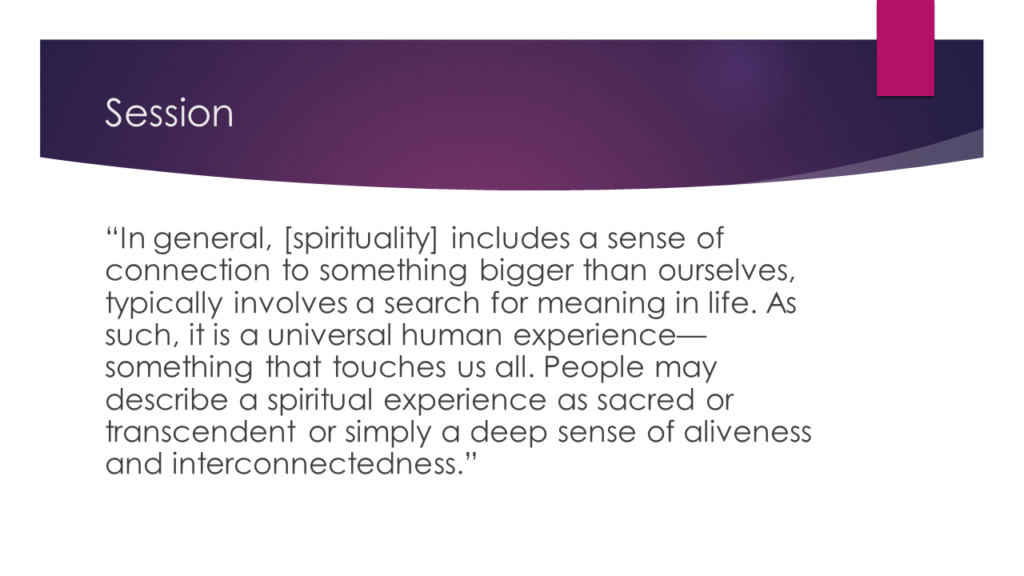
The author describes spirituality as a “sense,” similar to a feeling or belief that goes beyond sensory experience. In her book, Dana Zohar expanded on the theory of multiple intelligences[3] to include an “existential” intelligence, which she called “spiritual intelligence” or “SQ.” Spiritual intelligence has been defined as “the human capacity to ask questions about the ultimate meaning of life and the integrated relationship between us and the world in which we live.”[4]
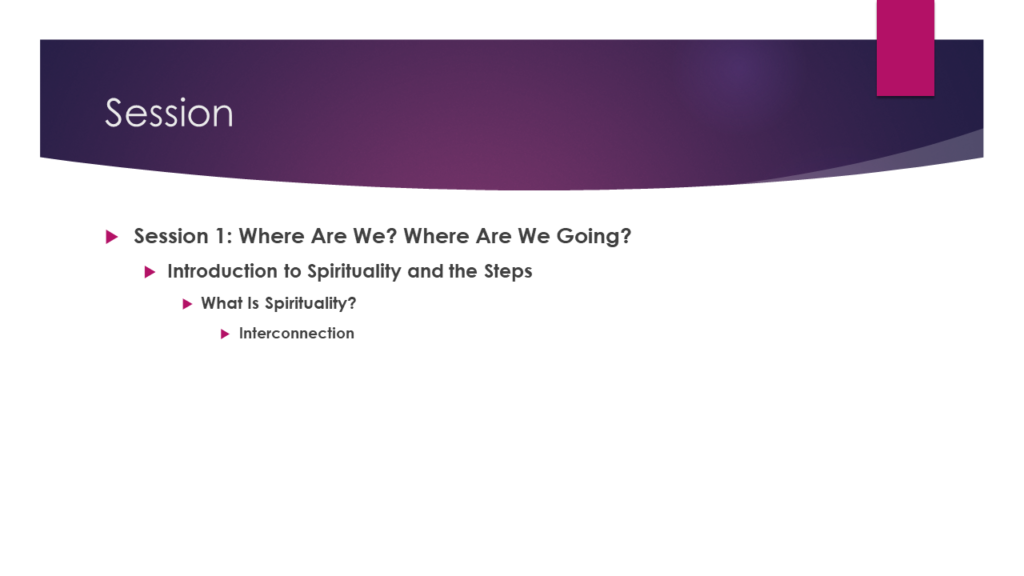
The critical element in our understanding of spirituality seems to be that sense of connection or relationship. We’ve heard it said that humans are social animals. We yearn to be connected, to enter into relationship. That’s at the core of our human longing and, as we shall see, it’s also at the core of our deepest fears. Our question now is: we long for a connection to or relationship…but with what?
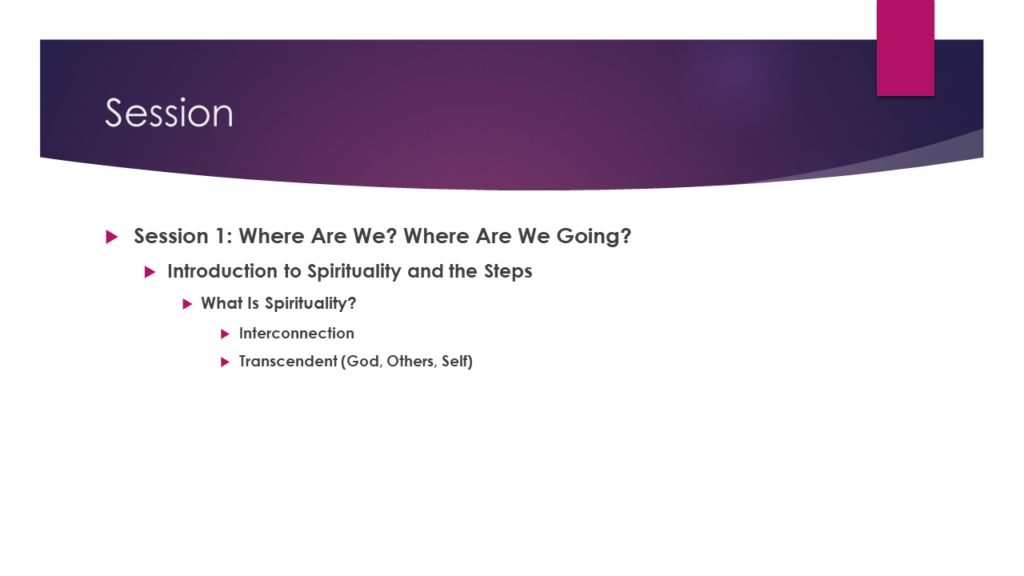
The definitions we’ve cited talk about “something bigger than ourselves” or “the world in which we live,” or “the Transcendent.” Yet, we have to ask, does it make sense to have a relationship with something that’s incapable of having a relationship with us? We can own inanimate things, or use them, but can we realistically say that we can enter into a relationship with them? What about our “deep sense of aliveness and interconnectedness?” It would seem that whatever we share an interconnectedness with must necessarily be personal, and therefore, the Transcendent must be personal.
Spirituality suggests a connection to something personal—someone—outside of ourselves. Our definition of spirituality talks about something transcendent, that is, something beyond the limits of our personhood and personality. The “world in which we live,” or the universe, is certainly outside, beyond, and bigger than ourselves. Spirituality, then, explores our connection to that universe and our relationship with it. Some would limit the universe to a mass of mindless matter and energy. However, that would imply that we conscious beings are separate from the rest of the universe and are somehow apart from it. Does that make sense? If life is part of the universe, and if consciousness is part of the universe, then the universe itself must encompass conscious life. Therefore, when we talk about the Universe as transcendent, we capitalize the “U.” We can’t have a relationship with inanimate things, but we can, indeed, search for a relationship with the Universe with a capital “U” and all things that make it up: all of its immensity and all of its diversity.
We can also have a connection to and relationship with humanity. Spirituality recognizes the interconnectedness of all people. Humanity itself is transcendent. We’re only one tiny dot in an enormous mass of conscious beings. We seek to understand our relationship with humanity, not only as a collective but as individuals. Our connection to them is clear and simple. But building a relationship with them is anything but. It takes effort. Our spirituality motivates us to make that effort.
Our interconnectedness to the Universe and to our fellow human beings seems obvious. What might not seem so obvious is our interconnectedness to ourselves. We are irrevocably connected to our individual pasts, and to our personal futures. We are today the result of our entire history and the sum total of all our decisions. Who we shall become will result from the decisions we make today. Our future selves are beyond and bigger than the selves we are now. In that sense, our future selves are transcendent. Spirituality acknowledges and seeks out the people we could be and will be.
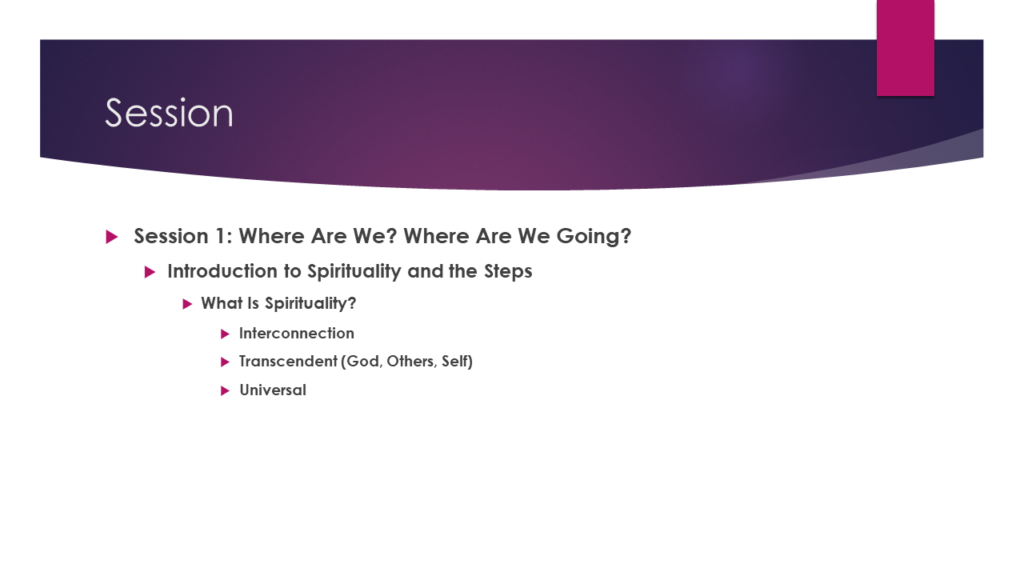
So far, we’ve determined that spirituality is a sense of connection and relationship to a three-dimensional Transcendent: the Universe, our fellow humans, and our future selves. Our definition suggests that spirituality is a “universal human experience.” Since spirituality is universal, therefore there can only be only one spirituality that applies to all people.
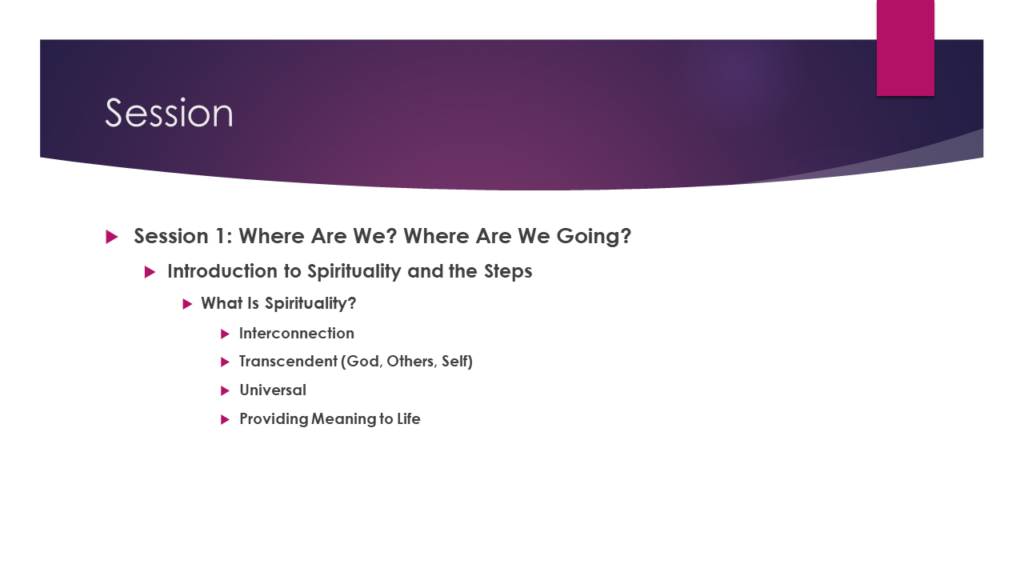
That also means it’s not optional. No one can successfully escape from the call to spiritual growth. Why? Because spirituality is our motivation to find meaning in life. Every decision that we make is informed by our spirituality—that is, our understanding and appreciation of the meaning of our lives in relation to the Transcendent however we understand it.
That completes our definition of spirituality. It’s a universal sense of interconnection with the Transcendent—that is, God and the Universe, humanity and our own destiny. It’s universal and inescapable because it provides meaning to human life.
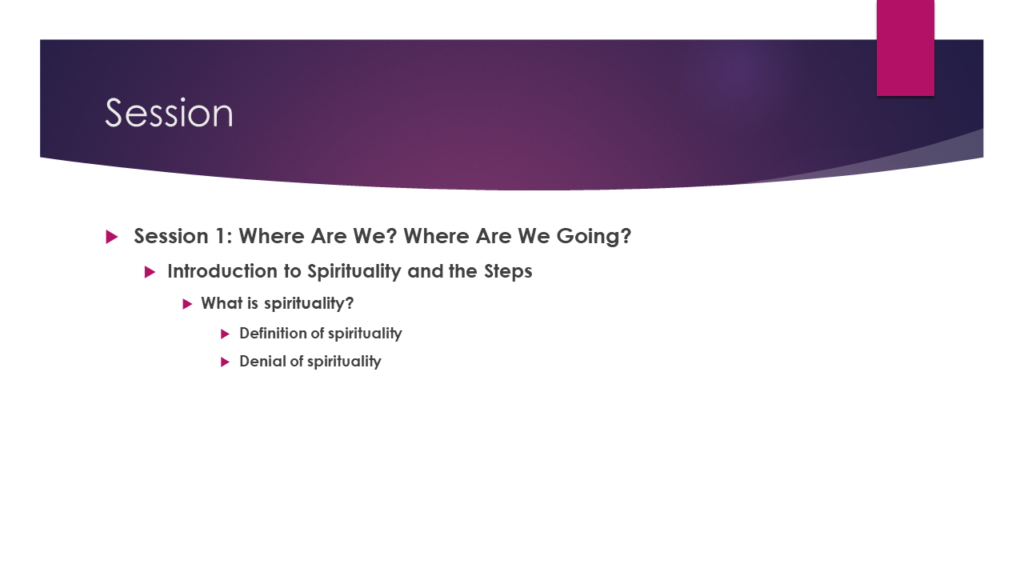
What happens when spirituality is dismissed, ignored, or outright denied? What happens when someone refuses to consider her or his life in relation to the Transcendent? Remember, spirituality is not optional. Denial of spirituality has real consequences. Without a relationship to the Transcendent, a person’s life is without meaning, purpose, or direction. Such a person is adrift on a sea of whims and random impulses, inconsistent and unmotivated. Meaninglessness, purposelessness, and isolation are all symptoms of this spiritual disease.
These three things—meaninglessness, purposelessness, and isolation—are the cause of all our fears. We can imagine nothing worse than being alone with nowhere to go and no reason to exist. Our Scriptures talk about hell in terms of fire, but the reality—this reality—is so much worse. Those who think they’ll have a lot of company in hell have no idea what hell really is. It’s utter separation from God and the Universe, from others, and from any possibility of happiness. Who needs fire?
What are our worst fears? There’s losing our connection with the Universe and being powerless to create or change things to protect and advance our lives. Then there’s losing our connection with others and being the object of rejection, scorn, and ridicule. And then there’s losing our connection with ourselves and our ability to manage our lives and our destinies. These are our fears. When we’re confronted with our worst fears, what do we do? We focus on ourselves. We become selfish and self-centered. We isolate. We either go on the attack or retreat into ourselves.
Now, let’s review. Spirituality is a universal sense of interconnection with the Transcendent—that is God and the Universe, humanity, and our own destiny. It’s an interconnection that provides meaning to life. We suffer and cause suffering when we become disconnected from the Transcendent. Our fears—our existential angst—and selfish self-interest are the symptoms of a spiritual disease.
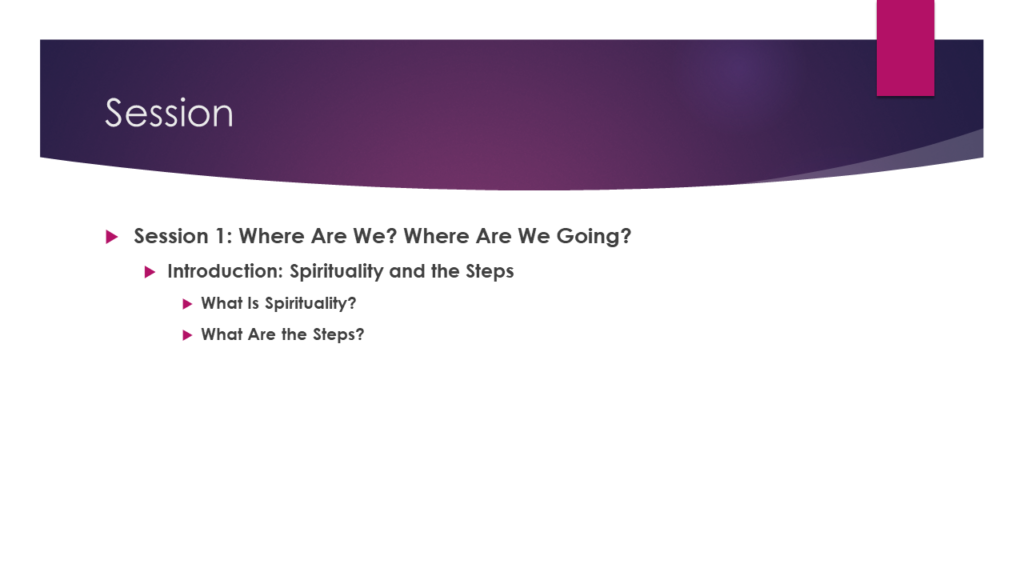
We’re now faced with a conundrum that’s plagued the human race since the beginning: how do you treat a spiritual disease? There’ve been literally thousands of answers, some more effective than others. Yet they all take a similar approach. They have to. There is only one spirituality. We’re going to look at one very effective approach. It began with a Christian organization called the Oxford Group. It was formed in 1921 by a Lutheran minister named Frank Buchman at the Hartford Theological Seminary, in Hartford, Connecticut. The group believed that “the root of all problems were the personal problems of fear and selfishness”—in other words, a spiritual disease. It taught that “the solution to living with fear and selfishness was to surrender one’s life over to God’s plan.” Almost every spiritual teacher throughout history has arrived at the same conclusion: that the solution to the spiritual disease is to surrender to the Transcendent. The big question, of course, is: how do you go about this?
Buchman came up with a six-step program, a roadmap that anyone could follow. Here are the six steps:
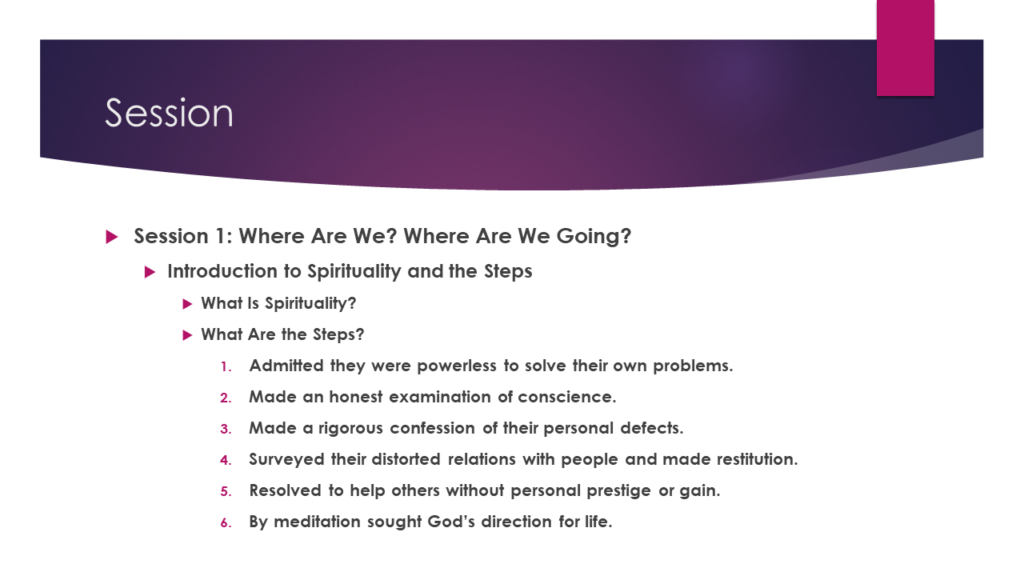
Since the symptoms of the spiritual disease are fear and self-centeredness, they rightly taught that changing our focus away from ourselves and surrendering to the Transcendent—to something outside of ourselves—was an essential first step. From there, they sought through self-examination and confession of faults and resolution of interpersonal inequities to reestablish a connection between their current and future selves and between them and others.
In the 1930s, several individuals tried to apply the principles of the Oxford group to people suffering from addiction. They instinctively recognized that addictive behavior was another symptom of the same spiritual disease. What they found was that in practice, these principles actually worked. They also found that the Oxford Group’s first step worked relatively well for Christians because they already had a relationship with the Transcendent, that is, God. Many of the addicted people they were dealing with had given up on God. They saw that, in order to get to the point of fostering spiritual growth, they first had to break down barriers of resistance and establish a basic connection to some sort of Transcendence.
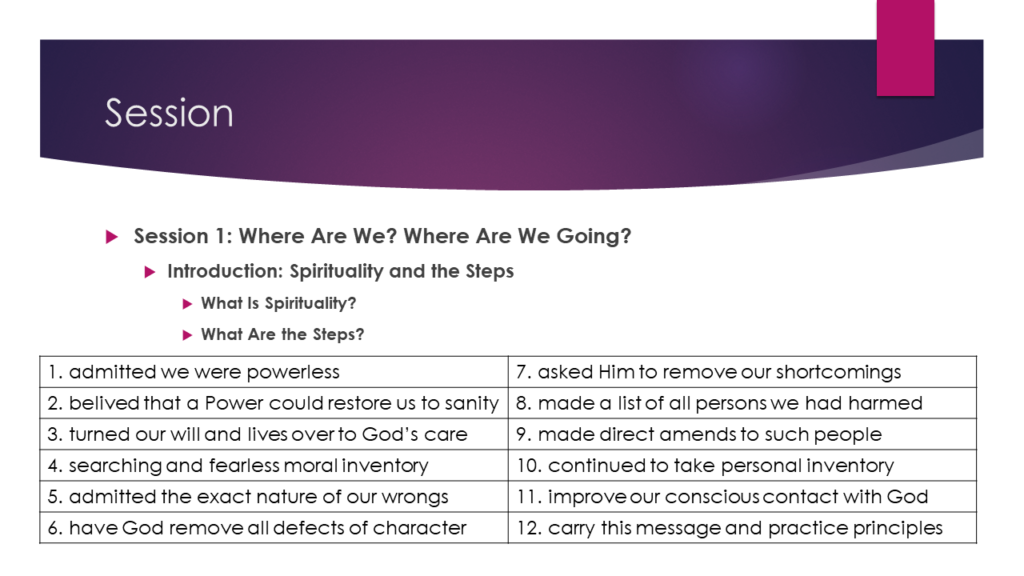
Here are the twelve steps of Alcoholics Anonymous. I have made some minor edits to make them more universally applicable. Please keep in mind that although these steps were formulated by the founders of Alcoholics Anonymous, they’re not designed to treat alcoholism per se. They’re designed to create a spiritual interconnection with God, with the self, and with others that can make possible a meaningful life—a life where fear, self-centeredness, and escape into addiction will become unnecessary.
Before we go on to the critical first step, let’s just pause for a moment to consider how these steps propose to heal the spiritual disease.
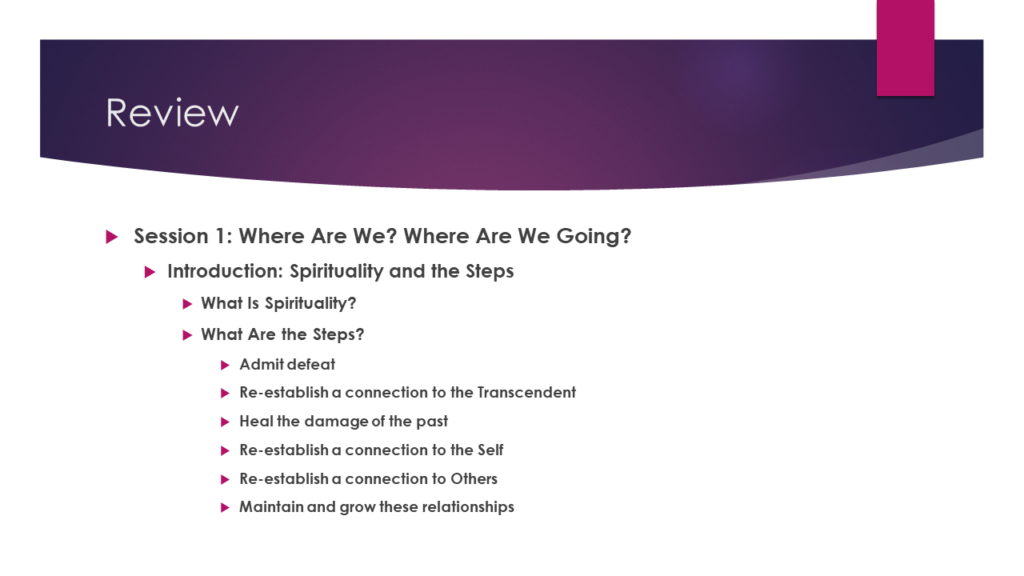
To begin with, it’s essential to admit defeat, that our way hasn’t worked. Then we need to be able to open ourselves up to the Transcendent and reestablish a connection with God. Then, in order to move forward, we have to relieve ourselves of the burden of our harmful decisions from the past. Once freed, we’re able to reestablish a relationship with ourselves. Only then, after healing our relationships with God and ourselves, can we begin to reestablish our relationships with others. Finally, we have to be acutely aware that this isn’t a one-and-done. We need tools to maintain these critical relationships. In a moment, we’ll start looking at the first step.
[1] Taking Charge of Your Health & Wellbeing. “What Is Spirituality? | Taking Charge of Your Health & Wellbeing,” n.d. https://www.takingcharge.csh.umn.edu/what-spirituality.
[2] Zohar, D., ReWiring the Corporate Brain: Using the New Science to Rethink How We Structure and Lead Organizations (1997; ISBN 9971-5-1214-9)
[3] Gardner, Howard E. Multiple Intelligences: The Theory In Practice, A Reader. Basic Books, 1993.
[4] Sahebalzamani, Mohammad. “The Relationship between Spiritual Intelligence with Psychological Well-Being and Purpose in Life of Nurses.” PubMed Central (PMC), February 1, 2013. https://www.ncbi.nlm.nih.gov/pmc/articles/PMC3748553/.
